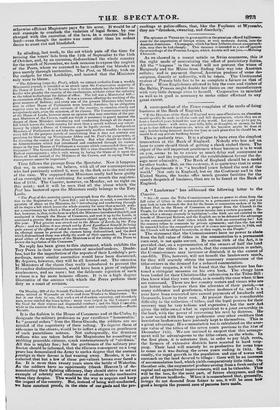In alluding, last week, to the act which puts off
the time for revising the voters' lists from the 15th of September to the 15th of October, and, by an omission, disfranchised the whole country for the month of November, we took occasion to expose the neglect of the Peers, whom we assumed to have suffered tile blunder to
pass merely through inattention. The Post, on Monday, took up the cudgels for their Lordships, and insisted that the Ministers only were to blame. "The following (says the Post), which we extract verbatim from a weekly Ninisterial journal, is intended as an attack upon the Conservative majority of the House of Lords. It will be seen that it strikes nobody but the indolent im-
beciles who plunder the country of the emoluments, without either the industry or the talent to discharge the duties of office. The bill was a Ministerial Ul-
an emanation of the Home Office. It was a measure affecting the working of the great measure of Reform; and every one of the present Ministers who have a seat in either House of Parliament were bound, therefore, by an obligation superior even to that of paid servants of the country, to examine closely and scrupulously each, even the minutest, of its clauses. The Conservative majority of the House of Lords, however mean an opinion they may entertain of the pre- sent Ministers of the Crown, could not think it necessary to guard against the danger of those Ministers introducing and conducting through all its stages a bill which leaves the whole country for more than a month without any consti- tuency by which a House of Commons can be legally elected. Independent Members of Parliament do not take the apparently needless trouble to exa every bill for the purpose merely of ascertaining that it does not contain any provision for blowing up Westminster Abbey and St. Paul's by gunpowder, or for diverting the course of the River Thames. But what should we think of an Administration which had introduced and conducted through its various Stages in the two Houses of Parliament a measure which commanded these per- formance; ? The General Disfranchisement Bill is thus described by our Whig- Itailieal contemporary ; who is only wrong in laying the blame of it upon tile House of Lords instead of the Ministers of the Crown, and in saying that the consequences cannot be important."
Then follows the passage from the Spectator. Now it happens that we, in common, we believe, with all of our contemporaries who had previously noticed it, were in the dark as to the real state of the case. We supposed that Ministers really had been guilty of an oversight in not continuing for another month the registra- tion of 1835. The Courier, however, on Monday, set us right on this point ; and it will be seen that all the abuse which the Post has bestowed upon the Ministers really belongs to the Tory Lords.
"The Post of this morning quotes a paragraph from the Spectator, in rela- tion to the Registration of Voters Bill ; and it heaps, as usual, a considerable quantity of abuse on the Ministers, fur" introducing and conducting through all its stages a bill which leaves the whole country for more than a month with- out a constituency by which a House of Common; can be legally elected." The fact, however, is, that, in the form in which the Ministers introduced that bill, and conducted it through the House of Commons, and sent it up to the Lords, it contained a proviso that none of its enactments should apply to the elections of this year. That proviso was struck out in the House of Lords, by the Tory Peers : and we believe it was struck out by Lord Lyndhurst himself, he being quite aware of the effects of what lie was doing. The Ministers therefore took an effectual means to prevent the electors being disfranchised, and the deed which disfranchised them was wholly the work of their opponents. This is no proof either of the negligence of the Ministers or of the utility of the Peers to review the legislation of the Commons."
No reply has been given to this statement, which exhibits the Tory Peers in their true characters of mischief-makers. Doubt- less, but for the imperfection of the reports of their Lordship's pro- ceedings, many similar enormities would have been discovered. By degrees, however, they will be all ferreted out. The omission by Ministers of the clause they really introduced to prevent the November disfranchisement, would have been a piece of culpable carelessness, and no more ; but the deliberate rejection of such a clause is a far more heinous offence. It is in a high degree illustrative of the animus with which the Peers perform their duty as a court of revision.


























 Previous page
Previous page